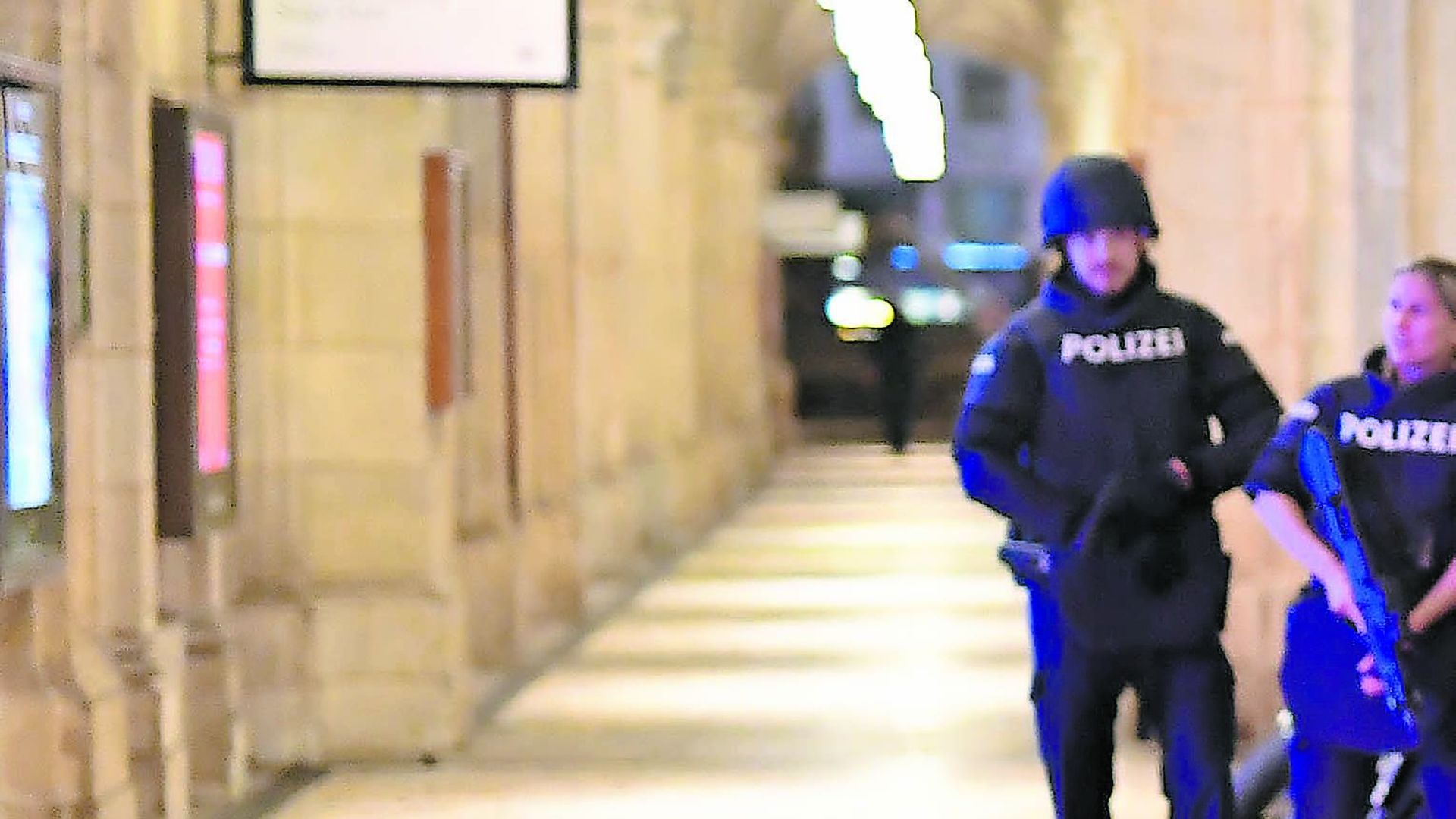
CATHRIN SCHAER on the latest European country coming to terms with an atrocity.
This week’s terror attack in Vienna was the first in the Austrian capital since 1981, when Palestinian gunmen stormed its main synagogue and killed two people.
Monday evening’s atrocity was also the most murderous, resulting in four deaths and more than a dozen injured, after a gunman, armed with an assault rifle, a machete and a fake suicide belt apparently ran around the historic centre of the city shooting passers-by at random, many of whom were marking the last night out before a new lockdown came into effect.
The assailant, a 20-year-old who had previously been jailed for connections to extremists, was shot dead by Austrian police.
But as the search for accomplices went on and the Viennese took shelter, the question was already being asked: Does Austria now have a growing problem with Islamist extremists?
The short answer seems to be: Comparatively speaking, no.
But there’s also a long answer and, as with discussions about this issue everywhere, it’s complicated.
While far-right and conservative Austrian politicians have found electoral success in painting local Muslims as a threat – even though the vast majority are clearly not – there is also debate within the European Muslim community itself as to what the religion should look like in the 21st century.
Just as elsewhere in Europe, Muslims in Austria are far from one homogenous group. There are estimated to be between 700,000 and a million in the country, making up at least 8% of the total population.
At last count, over half are Austrian citizens.
There are three major groups – the first Muslims who came from Bosnia and Herzegovina at the turn of the 20th century and then again in the 1990s after war in Yugoslavia; Turkish ‘guest workers’ who arrived in central Europe as labourers from the mid-1960s onwards and stayed; and finally, the most recent wave of Muslim migrants who have come to Austria as refugees from places like Syria, Iraq and Afghanistan.
The Turkish are the largest group, followed by the Bosnians and their neighbours. And the different community groups are influenced by different religious streams and sects, ranging from the strictly conservative to the more permissive.
Up until relatively recently, relations between Austria’s Muslims and other communities were perceived as comfortable.
From 1912 onwards, when Austria passed what is known as the ‘Islam Act’ to helpfully integrate new residents from the Balkans, Islam has been an officially recognised religion. And unlike many other European countries, local Muslims also have a national body that represents them, the Islamic Community of Austria.
“Discourse on Islam was largely marked by inclusion and recognition,” researchers at the Brookings Institute wrote in a 2019 study called The New Right: Austria’s Freedom Party and changing perceptions of Islam.
But, they also caution, that has changed significantly over the past few years, thanks mostly to the kind of rhetoric used successfully by the far-right Freedom Party, or FPÖ. Like many populist groups elsewhere, the FPÖ made an enemy out of the ‘other’ – in this case, Muslims and migrants – and that language was eventually adopted by the more centrist, but also conservative, party, the currently ruling People’s Party, or ÖVP.
The FPÖ and ÖVP led Austria in a coalition government between 2017 and 2019.
“Austria is like everywhere else in Europe,” Franz Winter, a professor of religious studies at the University of Graz said. “There is an ongoing discussion about Islam here and over the last few years a sort of bogeyman image has developed. It has become a loaded topic.”
Just how loaded – and perhaps also, how complex – is demonstrated by the recent controversy about a brand new, government-funded research centre in Vienna.
Earlier this year, when the new Austrian government was formed, thanks to an unprecedented coalition deal between the ÖVP, and the more left-wing Greens, the two parties agreed to establish a new centre to research topics such as anti-Semitism, religiously-motivated political extremism and racism.
By July though, the centre had a different name, and apparently a more singular focus: The Documentation Centre for Political Islam.
This is “a milestone in the prevention of extremism”, the country’s minister for integration and ÖVP member, Susanne Raab, boasted as she introduced the centre’s first projects in July. “With this, Austria is a leader in Europe.”
“This minister for integration has so far attracted more attention with unsuccessful speeches about the ‘problem’ of multilingualism and parallel communities, than about positive measures for integration,” Austrian journalist Barbara Coudenhove-Kalergi, countered in a critical August editorial.
“Political Islam is a much debated term,” she continued, “it refers to an ultra-conservative ideology that isn’t compatible with democracy and a liberal, constitutional state. Of course, this also exists in other religions.
A fundamentalist Catholic minority rejects existing Austrian laws on divorce and abortion. Ultra-Orthodox Jews live in a parallel society cut off from the majority. But up to now, all we have heard from officials is this message: Muslims are dangerous.”
Even the Muslim community is divided on the new centre. It “gives the impression that it wants to be a surveillance mechanism for the Muslim population,” suggested Ümit Vural, the head of the Islamic Community of Austria, as he ruled out any cooperation.
Meanwhile Ednan Aslan, a professor at the Institute for Islamic Theological Studies at Vienna University, believes the centre could be helpful: “Although the documentation centre cannot solve radicalisation altogether, it can make the structures that make radicalisation possible, more visible,” he argues, noting that extremist Muslim clerics working in Austria often come from other countries, including the UK.
Aslan is himself a Muslim but advocates a more liberal vision of his belief system.
“We are here [in Austria] and our numbers are growing,” he said, “and that is all the more reason that we need to think about solutions to prevent radicalisation.”









